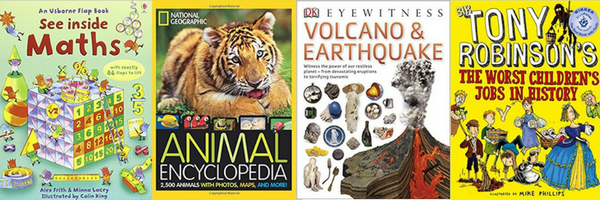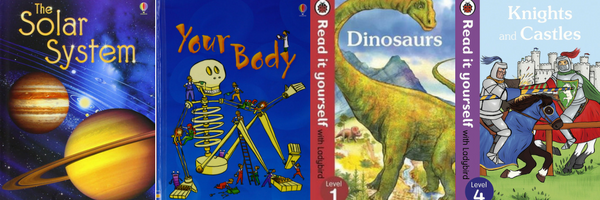The Importance of Non-Fiction
“One glance at a book and you hear the voice of another person, perhaps someone dead for 1,000 years. To read is to voyage through time.” – Carl Sagan
Reference books open the door to the world around us and there are some amazing choices out there for every possibility. They are information treasure chests that create discussion and debate, expand our knowledge and give us a deeper understanding of our past, present and future. What they are not, is dry, dusty tomes that can be found at the back of a classroom cupboard – reluctantly dragged out and worked through (systematically of course) with a test at the end! Heaven forfend! These wise beauties want to spark your imagination – they can jump-start creative play just like novels do – exploring space, digging for fossils or storming a castle! Learn about the solar system from the comfort of your very own cardboard box rocket, aspire to be a doctor as you learn how the respiratory system works or become a mini engineer when you build circuits for your own robot.
A quick browse through a book will help you gauge who the content is aimed at – lift-the-flaps, simpler sentences and fun pictures for the developing reader, moving onto detailed paragraphs and more complex ideas for the confident explorer looking for in-depth information. What I particularly love is the non-fiction books aimed at the developing reader. Usborne and Ladybird have always led the way on this and their Beginner’s Series/Read it Yourself range are perfect for helping new readers progress in their reading skills with fact-based books. Like the chapter books I discussed here, these books are specifically aimed at learning to read with clear text that doesn’t overwhelm the page, lots of pictures and are perfect for those that love fact more than fiction.

For the confident reader, the choice is of course a rich one – complex ideas are broken into manageable pieces and facts are presented with the enthusiasm they deserve. These books do not preclude young learners from picking them up of course! Working together to sound out new words, or just poring over the pictures can be a rewarding experience for even the littlest of reader. Reference books are springboards into learning and allow children to follow their passions and interests – this can be an opportunity to take things further than the limits of the classroom or for home educators to use as a base for new topics.
“Treat a child as though he is already the person he is capable of becoming” – Haim Ginott
Not all readers are readers of fiction. Many adults are non-fiction aficionados – their favourite place in a bookshop would be tucked deep in the history section among the royal intrigues or burrowed in the science section discovering what makes us tick. This same love can of course be found in children – they are the lovers of facts, the divers into research and the describers (in epic detail) of dinosaurs. We should never discourage this curiosity with a demand that they read “proper” books i.e. fiction. The fear seems to be most prevalent with those learning to read and the choices our little ones make. It always saddens me to hear a parent hesitate (or outright refuse) when a request is made for a reference book over a fiction book – if anything their reading would challenge them more, expanding both their vocabulary and their knowledge of the world! There is no wrong way to read – limits and rules are what we as adults think we need to impose. Autonomy builds confidence, independence, self-awareness and all the things we hope our children will grow up to embrace – this can begin with the choices we allow our children to make when we let them loose in a library or bookshop. Reference books should never be secondary to fiction – who knows what inspiration they can ignite and what path a child might follow when allowed to read freely and widely.
Happy Reading!
